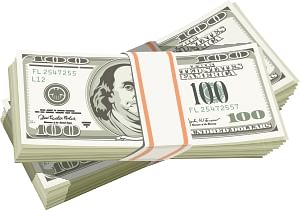Forex reserves hit $20b
Forex reserves hit $20b

Foreign currency reserves continued its record growth to reach $20 billion yesterday, thanks to weak import demand, private sector companies taking foreign loans on low interest, and the central bank's initiatives to keep the exchange rate stable.
Bangladesh has achieved the feat though exports and remittances, the two main drivers of foreign currencies inflow, have been witnessing a downtrend for the last few months.
The country's foreign reserves yesterday surged to $20.03 billion, placing Bangladesh second only to India in the subcontinent, said Deputy Governor Abu Hena Mohammad Razee Hassan of Bangladesh Bank (BB) at an impromptu press conference at the bank yesterday.
The reserves stood at $19.04 billion on March 19 and $1 billion was added to that in the last 20 days alone. The current reserve is equivalent to the bill of six months' total import of the country.
As of yesterday, India held $303 billion in reserves, which was slightly less than $10 billion in Pakistan.
“A stable exchange rate has helped us build up the reserve. Remittances also contributed to the growth,” said Abu Hena.
However, the remittance inflow continues to slide, dropping 5.3 percent in January on the back of declining numbers of migrant workers. The country received $1.25 billion in remittance in January this year against $1.32 billion for the same month a year ago.
Only 4.5 lakh migrants got oversees jobs in 2013, down by more than 33 percent from 2012, according to the Refugee and Migratory Movements Research Unit.
Data show the BB approved $1.19 billion in foreign loans in 2013, $1.49 billion in 2012 and $819 million in 2011. In the first three months of this year, the central bank has approved nearly $500 million foreign currency loans.
Monzur Hossain, a research fellow of Bangladesh Institute of Development Studies, thinks taking low-cost foreign loans is nothing bad, but upon maturity, it may create severe pressure on forex reserves.
“This type of overseas borrowings had led to the Asian crisis (in 1997) when borrowers had to pay a huge amount of foreign currency loans at a time,” Monzur said.
Such loans are also affecting the local lenders, who say they are losing many of their trusted clients.
The latest figure on exports showed it grew only 6.36 percent in February, reflecting a declining trend in the sector for the past few months.
The BB for the last 3-4 years has been buying US dollars from the market to keep the exchange rate stable, though it claims to follow the floating exchange rate policy, meaning that demand and supply of the market will determine the exchange rate.